
Topics
Guests
- Steven Wattsenior staff attorney with the newly formed Human Rights Working Group of the American Civil Liberties Union. He is the lead counsel in the Khaled El-Masri lawsuit challenging the CIA’s extraordinary rendition program.
- Michael Gabriel Goodfriendplays Mohammed El Rafi in the play Arrivals. He also produces radio show Leftjab on XM Satellite Radio.
Despite his exoneration by the Canadian government, the Bush administration is keeping Maher Arar on a terrorist watchlist despite requests from the Canadian government to remove him. Arar was seized by U.S. officials during a stopover flight in New York and sent to Syria where he was repeatedly tortured over the course of nearly a year. Meanwhile, “Arrivals,” a play here in New York, is putting Maher Arar’s ordeal on the stage. “Arrivals” actor Michael Gabriel Goodfriend joins us in the firehouse studio. We’re also joined by ACLU staff attorney Steven Watt for the latest on Arar’s case. [includes rush transcript]
Transcript
JUAN GONZALEZ: Democrats are renewing a push to ban the U.S. government from shipping people to countries that engage in torture. Congressmember Ed Markey of Massachusetts, supported by 44 other Democrats, re-introduced a bill this week to halt the practice known as “extraordinary rendition.” Lawmakers singled the, quote, “gross violation” of Maher Arar’s rights in re-introducing the bill.
AMY GOODMAN: Maher Arar is the Canadian citizen who was seized by U.S. officials during a stopover flight at New York’s Kennedy Airport in 2002. He was then secretly sent to Syria, where he was held for almost a year in a grave-like cell. He was tortured. He was then released without ever being charged with a crime. Last year, the Canadian government determined Maher Arar was innocent. They issued an an apology, agreed to pay him $9 million. The Bush administration has never apologized and is keeping Maher Arar on a terrorist watchlist, a no-fly list, despite requests from the Canadian government to remove him.
We’re joined now by Steven Watt, senior staff attorney with the newly formed Human Rights Working Group of the American Civil Liberties Union. He formerly worked at the Center for Constitutional Rights, where he helped represent Maher Arar. The latest on Maher Arar? You visited him, is that right?
STEVEN WATT: I visited him two weeks after he came out from detention in Syria. And I’ve been in regular contact with him since then and actually just spoke to him just this past weekend.
JUAN GONZALEZ: And why does the Bush administration continue to keep him on a no-fly list? Do they give any explanation?
STEVEN WATT: I mean, your guess is as good as mine. I mean, they claim to have information that would permit them to maintain him on that list, but the Canadian ambassador to Washington, D.C., has seen that very information and says it’s nothing new.
AMY GOODMAN: I wanted to turn to a clip of Maher Arar, who was arrested at Kennedy Airport, or held, detained, went to — sent to Syria. This is Maher Arar after he came out, released. The Canadian government says he’s innocent. He was speaking in October.
MAHER ARAR: I was transiting through New York airport, JFK Airport, when they asked me to wait in a waiting area. I found that to be strange. Shortly after, some FBI officials came to see me, and they asked me whether I was willing to be interviewed. My first and immediate reaction was to ask for a lawyer, and I was surprised when they told me that I had no right to a lawyer because I was not an American citizen. Eventually, on October 8th, against my will, they took me out of my cell. They basically read a piece of document to me saying that “we will be sending you to Syria.” And when I complained, I said to them, “I did explain to you that if I’m sent back, I will be tortured.”
And I remember the INS person flipped a couple of pages in this document to the end of this document and read to me a paragraph that I still remember until today. It’s an extremely shocking statement she made to me. She said something like, “The INS is not the body or the agency that signed the Geneva Convention Against Torture.” For me, what that really meant is, “We will send you to torture, and we don’t care.”
After 12 hours of detention, unlawful detention, in Jordan, I was eventually driven to Syria. And I just didn’t want to believe that I was going to Syria. I always was hoping that someone — a miracle would happen, the Canadian government would intervene, a miracle would happen that would take me back to my country, Canada. I arrived in Syria that same day at the end of the day, and I was able to confirm that I was, in fact, in Syria after my blindfold was removed and I was able to see the pictures of the Syrian president. My feeling then — my feeling then is, I just wanted to kill myself, because I knew what was coming. I knew that the Americans, the American government, sent me there to be tortured.
AMY GOODMAN: An excerpt of Maher Arar’s acceptance speech after he was awarded the Institute for Policy Study’s Letelier-Moffitt Human Rights Award in October.
Well, here in New York, a new play is being performed that puts Maher Arar’s ordeal on the stage. It’s called Arrivals, and it centers around a Syrian-born Canadian citizen. He’s called Mohammed El Rafi. The part is played by actor Michael Gabriel Goodfriend, who also joins us in our firehouse studio.
You’re performing this at the Bank Street Theatre, Michael. It is a powerful production, yet I’ve heard very little about it.
MICHAEL GABRIEL GOODFRIEND: It’s been very frustrating. We had a terrific producer. We had a terrific producer, Jay Harris, who won a Tony Award for Side Man. We have an Obie Award-winning director, Dan Wackerman. And we have a terrific cast. And the playwright David Gow is one of the leading playwrights from Canada. Yet with the staunch and relentless effort of our publicist, Gary Springer, we still were not able to attract members of the press. The New York Times did come opening night, but did not write a review.
AMY GOODMAN: A reporter and a photographer?
MICHAEL GABRIEL GOODFRIEND: Yes, that’s correct, a critic and a photographer. And we stayed after the show. They wanted photographs. We staged some photos and never saw a review. And then, finally we’re told by the critic that she was going to write a feature on political theater, in which we would be mentioned. That never happened. And then she later told the reviewer — or, I’m sorry, the publicist that she was simply not going to write a review, because she didn’t care for the play. We weren’t able to attract The Village Voice even until a week ago, and we’re set to close tomorrow. So it’s been very frustrating.
JUAN GONZALEZ: And how long has the play been running?
MICHAEL GABRIEL GOODFRIEND: It’s been running for four weeks. And, you know, the word of mouth has been fantastic. We have played to full houses. It’s clearly that the American public and that the New York theater-going public cares deeply about and wants to talk about, but it’s been just like being in an echo chamber of our own, as far as the press is concerned. We haven’t been able to attract — until Democracy Now! came, we were not able to attract any of the more leading members of the press.
AMY GOODMAN: Yet it’s an extremely powerful rendering of — I mean, it’s not exactly the case of Maher Arar, but you, who play Mohammed, at Kennedy Airport and the relationship with trying to communicate with your wife in Canada. You have two children. Of course, this is similar to Maher Arar.
MICHAEL GABRIEL GOODFRIEND: Yes. Well, it’s a very powerful story. And David Gow, the playwright, was trying to magnify the story outward to the hundreds — thousands, perhaps — of other people like Maher Arar, who have been detained, deported and tortured under the policy of extraordinary rendition. And one of the lines in the play is that — that Mohammed says is — “I’m telling you the truth. The truth is not an act of negotiation,” which is one of the themes throughout the play, that there is no way to change the truth when somebody is innocent.
And it gets to a point of such bleakness, Mohammed, the character that I play, is locked in a cell, a seven-foot long, six-foot high, three-foot wide cell, like Maher Arar was in Syria, and in a point a desperation, he composes a letter to his wife and says, “I’m writing to you on a piece of black slate with a piece of white chalk extruded from my heart. How much we take for granted in times of peace, how lost we become in a struggle for prosperity.” And he goes on to say that he feels he hasn’t seen his wife and his children for years, because he’s been caught up in his work and that because of this experience, the things that truly matter to him — his wife, his family — really come to the forefront, and because of his wife’s relentless hard work and the work that she does with an attorney who represents the consul, he’s finally able to be freed, very like Maher Arar’s story. But you think about the hundreds, thousands of people who don’t have those kinds of advocates working on their behalf, and it’s a devastating tragedy.
AMY GOODMAN: Well, there are still three performances left: Friday night, Saturday afternoon and Saturday night. It is a play that people will not forget, very much bringing home this issue of what’s called extraordinary rendition, which is —
MICHAEL GABRIEL GOODFRIEND: Kidnapping and torture.
AMY GOODMAN: An extraordinary term for kidnapping. Arrivalstheplay.com is the website, if people want to get information.
Thirty seconds on the issue of Khalid El-Masri. I wanted to ask you about the latest information, the latest court decision on Khalid El-Masri.
STEVEN WATT: The Fourth Circuit Court of Appeals denied Khalid El-Masri his day in court. They basically affirmed that the government’s position that litigation of this case would be harmful to national security —
AMY GOODMAN: A man kidnapped in Macedonia by U.S. forces and sent to Afghanistan.
STEVEN WATT: Exactly, kidnapped by the Americans, recorded in front-page stories in The Washington Post, New York Times, and known around the world, yet the Fourth Circuit Court of Appeals said you cannot litigate this case in a court in this country because it would be harmful to this country’s national security.
AMY GOODMAN: Maher Arar’s case also now on appeal.
STEVEN WATT: Exactly.
AMY GOODMAN: We’ll see what happens. Well, I want to thank you, Steven Watt, for joining us, of the ACLU, as well as Michael Gabriel Goodfriend, acting in Arrivals at the Bank Street Theatre.

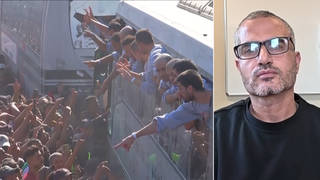
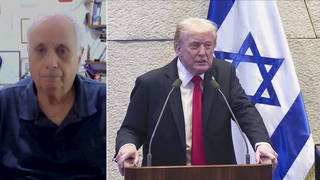
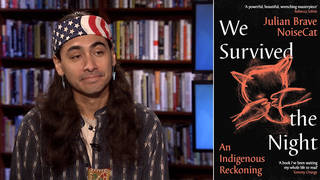
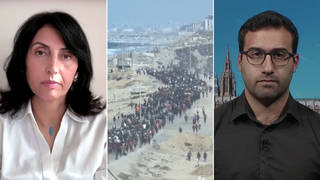





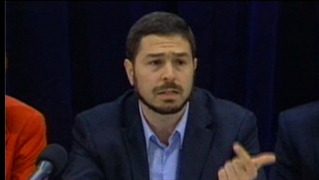
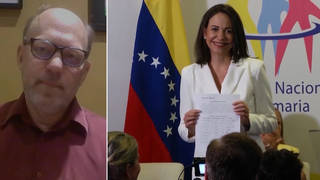
Media Options